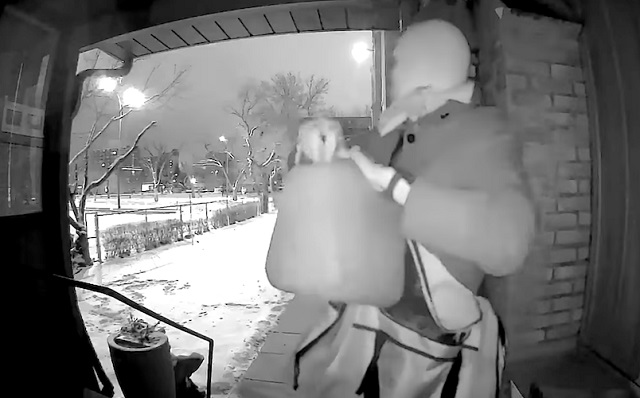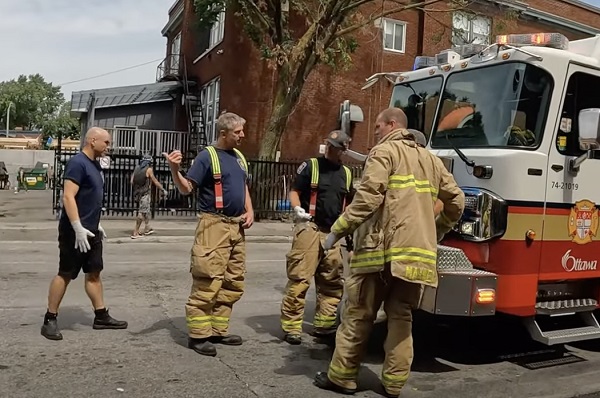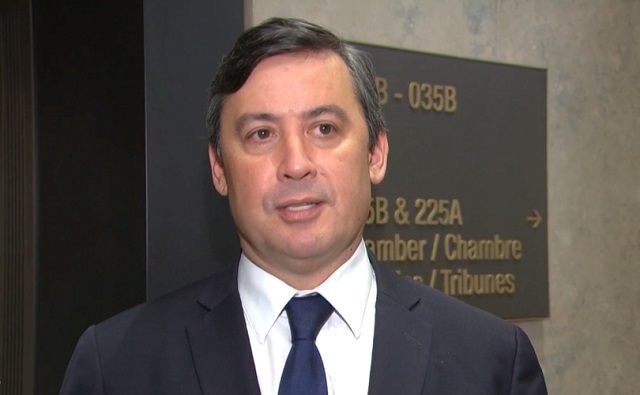Crime
This hits pretty close to home

Curtis Phagoo is a well-known musician and business person who I’ve come to know through the local music scene. This is his description of a harrowing experience this past Friday night in our city. It’s a reminder to be very careful and vigilant with your personal safety.
Re-printed with permission by Curtis Phagoo
Addressing personal experiences is not an easy thing for me to do, but my experience this weekend needs to be told, as I believe many people close to me and working in the same industries as me are in danger of the same thing happening to them.
On Friday night, at 10pm myself and a friend ran into each other outside an establishment and were catching up when we were attacked by 3 men, one using a cane as a weapon.
I also think it is important to note that I am not naming the establishment or general location. Unfortunately, I believe it is important to know that this sort of thing can happen anywhere in Red Deer. We need to understand that this is not some sort of isolated incident. This happened at a busy time, 10 feet directly outside the entrance, not some dark corner or alley.
Now let’s talk about the 3 men. These men were more like zombies than men. They showed no emotion, or remorse. I don’t know for sure, but I would assume they were in some sort of drug-induced state. It’s hard to say exactly what happened, but this is what I remember;
They came around the corner and attacked with the cane, dropping one of us. Then they started kicking and reaching…maybe for keys (I think the aim was to steal a vehicle).
I think they were expecting less of a fight, or maybe just one person to be there, but what started as a very aggressive act quickly died as they returned to a Zombie like state of confusion and we were able to escape into the establishment. Make no mistake, this was an incredibly violent act hospitalizing one of us. This ended very badly, but could have been much worse, if not fatal.
In sharing this story I hope that people will be more active in their own safety, as I wasn’t. I think it is really important to be in groups. Going for a smoke? Grabbing something from your car? Headed home? Go in numbers!
The more the better. We need to be proactive in protecting ourselves and one another. It is really dangerous out there.
Crime
Canadian receives one-year jail sentence, lifetime firearms ban for setting church on fire

From LifeSiteNews
Jordan Willet was convicted of starting a blaze in February at Blessed Sacrament Parish in Regina, Saskatchewan.
A man who was charged with arson after trying to burn down a historic Catholic church earlier this year was handed only a one-year jail sentence for his crime but has also been banned from being able to possess firearms for life.
On April 9, a court sentenced Jordan Willet, 31, to 278 days in jail for intentionally or recklessly causing damage by fire or explosion to property and for not complying with a probation order. In February, LifeSiteNews reported that Willet had been arrested and charged with starting a fire at Blessed Sacrament Parish in Regina, Saskatchewan, on February 9.
He pleaded guilty to both charges and also received an 18-month probation sentence along with a lifetime firearm prohibition.
Over the weekend, Fr. James Hentges, the parish pastor, said he was “relieved he is in custody and is not a threat.”
The parish had posted footage of the February 9 attack on social media and put out a plea for anyone who had information on the event to report it to police.
The video footage of the attack, taken from a doorbell camera, shows Willet, in a mask, pouring fuel on the church before setting it on fire.
Fire investigators determined that the blaze was caused by a direct act of arson.
Since the spring of 2021, more than 100 churches, most of them Catholic, have been burned or vandalized across Canada. The attacks on the churches came shortly after the unconfirmed discovery of “unmarked graves” at now-closed residential schools once run by the Church in parts of the country.
In 2021 and 2022, the mainstream media ran with inflammatory and dubious claims that hundreds of children were buried and disregarded by Catholic priests and nuns who ran some of the schools.
Despite the church burnings, the federal government under Prime Minister Justin Trudeau has done nothing substantial to bring those responsible to justice or to stem the root cause of the burnings.
The claims, which were promoted by Trudeau among others, lack any physical evidence and were based solely on soil disturbances found via ground-penetrating radar.
In fact, in August 2023, one such site underwent a four-week excavation and yielded no remains.
Despite the lack of evidence, the Canadian Broadcasting Corporation (CBC) and others have continued to push the narrative, even running a report recently that appeared to justify the dozens of attacks against Catholic churches.
In January, Conservative Party leader Pierre Poilievre not only condemned the rash of church burnings in Canada but called out Trudeau for being silent on the matter.
Addictions
Liberal MP blasts Trudeau-backed ‘safe supply’ drug programs, linking them to ‘chaos’ in cities

First responders in Ottawa dealing with a crisis Fridayman 0102 / YouTube
From LifeSiteNews
‘There is certainly the perception by a lot of Canadians that a lot of downtown cores are basically out of control,’ Liberal MP Dr. Marcus Powlowski said, before pointing specifically to ‘safe supply’ drugs and injection sites.
A Liberal MP has seemingly taken issue with “safe supply” drug policies for increasing public disorder in Canada, policies his own party, under the leadership of Prime Minister Justin Trudeau, has endorsed.
During an April 15 health committee meeting in the House of Commons, Liberal MP Dr. Marcus Powlowski, while pressing the Royal Canadian Mounted Police (RCMP), stated that “safe supply” drug policies have caused Canadians to feel unsafe in downtown Ottawa and in other major cities across the country.
“There is certainly the perception by a lot of Canadians that a lot of downtown cores are basically out of control,” Powlowski said.
“Certainly there is also the perception that around places like safe supply, safe injection sites, that things are worse, that there are people openly stoned in the street,” he continued.
“People are getting cardio-pulmonary resuscitation performed on them in the street. There are needles around on the street. There is excrement on the street,” Powlowski added.
“Safe supply“ is the term used to refer to government-prescribed drugs that are given to addicts under the assumption that a more controlled batch of narcotics reduces the risk of overdose – critics of the policy argue that giving addicts drugs only enables their behavior, puts the public at risk, disincentivizes recovery from addiction and has not reduced, and sometimes even increased, overdose deaths where implemented.
Powlowski, who has worked as an emergency room physician, also stated that violence from drug users has become a problem in Ottawa, especially in areas near so-called “safe supply” drug sites which operate within blocks of Parliament Hill.
“A few months ago I was downtown in a bar here in Ottawa, not that I do that very often, but a couple of colleagues I met up with, one was assaulted as he was going to the bar, another one was threatened,” said Powlowski.
“Within a month of that I was returning down Wellington Street from downtown, the Rideau Centre, and my son who is 15 was coming after me,” he continued. “It was nighttime and there was someone out in the middle of the street, yelling and screaming, accosting cars.”
Liberal MP Dr. Brendan Hanley, the Yukon’s former chief medical officer, testified in support of Powlowski, saying, “My colleague Dr. Powlowski described what it’s like to walk around downtown Ottawa here, and certainly when I walk home every day, I encounter similar circumstances.”
“Do you agree this is a problem?” Powlowski pressed RCMP deputy commissioner Dwayne McDonald. “Do you agree for a lot of Canadians who are not involved with drugs, that they are increasingly unhappy with society in downtown cores which are this way? Do you want to do more about this, and if you do want to do more about this, what do you need?”
McDonald acknowledged the issue but failed to offer a solution, responding, “One of the success factors required for decriminalization is public support.”
“I think when you are faced with situations where, as we have experienced in our communities and we hear from our communities, where public consumption in some places may lead to other members of the public feeling at risk or threatened or vulnerable to street level crime, it does present a challenge,” he continued.
Deaths from drug overdoses in Canada have gone through the roof in recent years, particularly in British Columbia after Trudeau’s federal government effectively decriminalized hard drugs in the province.
Under the policy, which launched in early 2023, the federal government began allowing people within the province to possess up to 2.5 grams of hard drugs without criminal penalty, but selling drugs remained a crime.
The policy has been widely criticized, especially after it was found that the province broke three different drug-related overdose records in the first month the new law was in effect.
The effects of decriminalizing hard drugs in various parts of Canada has been exposed in Aaron Gunn’s recent documentary, Canada is Dying, and in U.K. Telegraph journalist Steven Edginton’s mini-documentary, Canada’s Woke Nightmare: A Warning to the West.
Gunn says he documents the “general societal chaos and explosion of drug use in every major Canadian city.”
“Overdose deaths are up 1,000 percent in the last 10 years,” he said in his film, adding that “[e]very day in Vancouver four people are randomly attacked.”
-

 COVID-1917 hours ago
COVID-1917 hours agoCDC Quietly Admits to Covid Policy Failures
-

 Brownstone Institute8 hours ago
Brownstone Institute8 hours agoDeborah Birx Gets Her Close-Up
-

 COVID-1920 hours ago
COVID-1920 hours agoJapanese study shows disturbing increase in cancer related deaths during the Covid pandemic
-

 Great Reset15 hours ago
Great Reset15 hours agoClimate expert warns against extreme ‘weather porn’ from alarmists pushing ‘draconian’ policies
-

 espionage23 mins ago
espionage23 mins agoConservative MP testifies that foreign agents could effectively elect Canada’s prime minister, premiers
-

 Economy2 days ago
Economy2 days agoExtreme Weather and Climate Change
-

 Bruce Dowbiggin2 days ago
Bruce Dowbiggin2 days agoWhy Are Canadian Mayors So Far Left And Out Of Touch?
-

 International2 days ago
International2 days agoTelegram founder tells Tucker Carlson that US intel agents tried to spy on user messages

